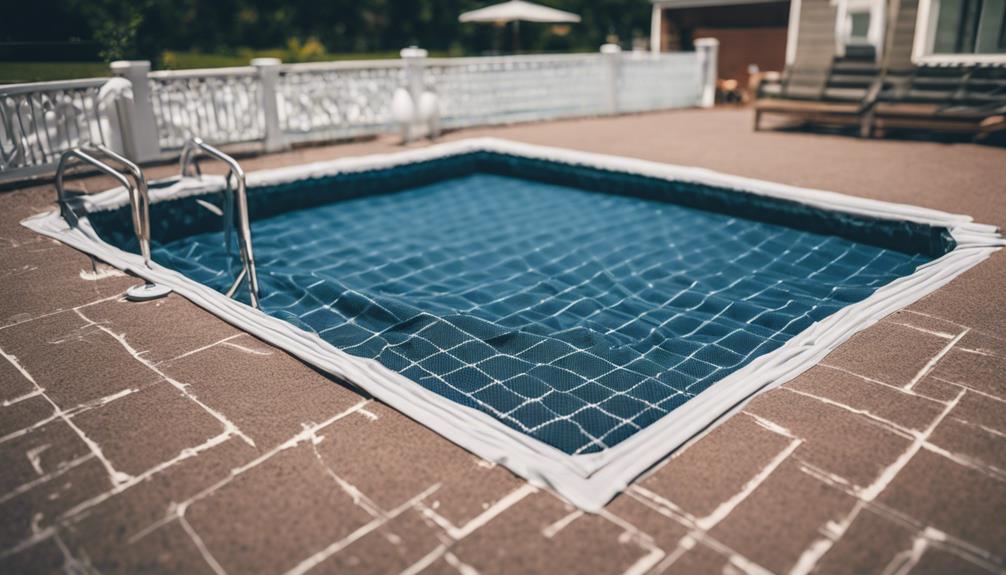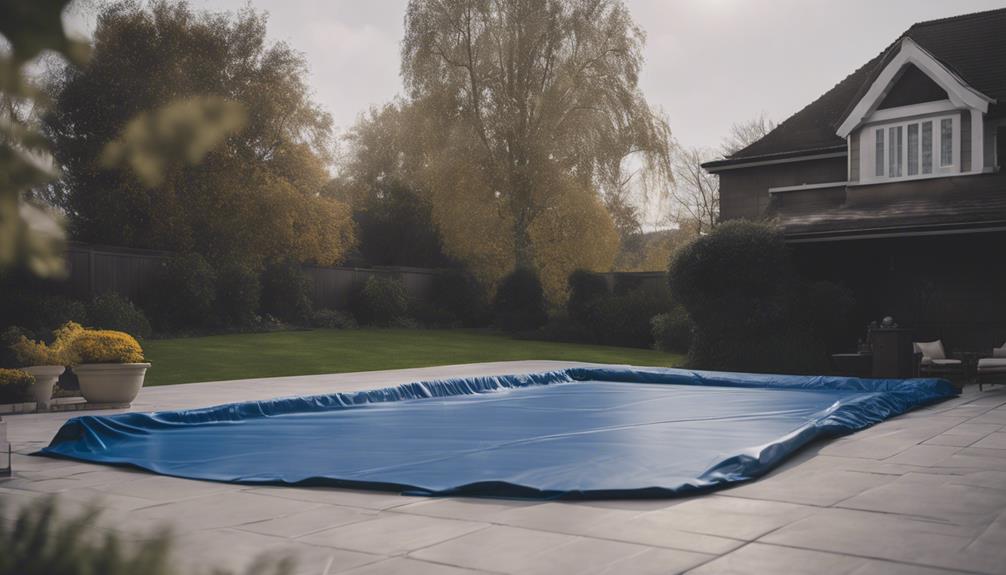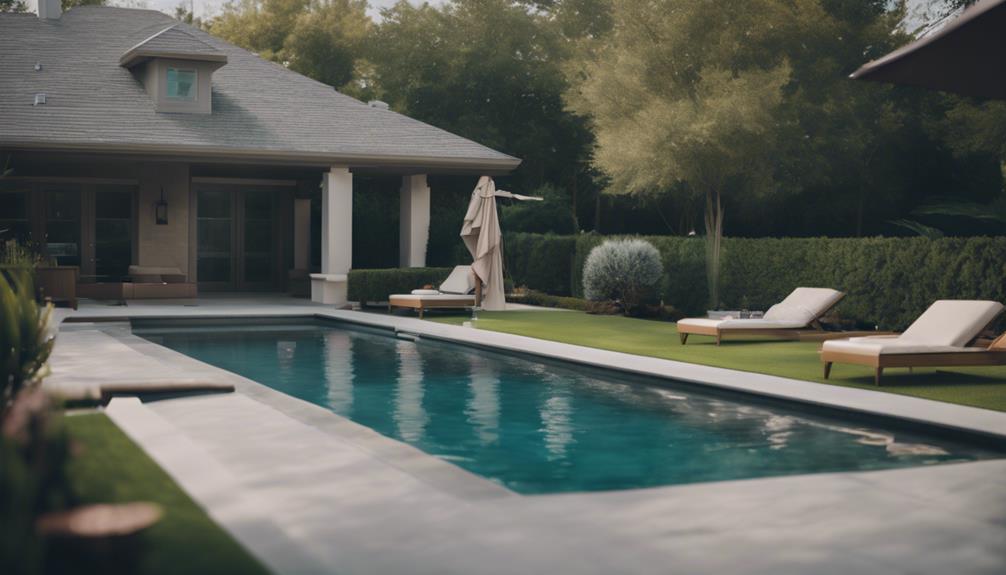When choosing a pool cover, consider the size, shape, and material for the best fit. The cover should extend at least 3 inches past the pool edge and maintain proper dimensions. Standard covers work for common pool shapes, while unique shapes may require custom options. Material choice depends on factors like sunlight penetration and durability. Automatic covers offer convenience and maintenance benefits, trapping heat and minimizing debris. A high-quality cover reduces cleaning needs, algae growth, and water evaporation. Follow these tips for best pool protection and maintenance.
Key Takeaways
- Measure your pool accurately for proper cover size, extending at least 3 inches past the pool edge.
- Consider pool shape; symmetrical shapes like rectangular are easier to find covers for.
- Choose cover material based on climate and needs: mesh for lightness, solid for algae prevention.
- Evaluate automatic covers for convenience, heat retention, and debris prevention.
- Invest in a high-quality pool cover to reduce maintenance, minimize evaporation, and maintain water quality.
Pool Cover Size Considerations
Determining the appropriate size of your pool cover is essential for effective protection and maintenance of your pool. In-ground pool covers should extend at least 3 inches past the pool edge to guarantee proper coverage.
To find the correct dimensions, measure your pool accurately. Standard size covers are more readily available and cost-effective, but for non-standard pool sizes, custom covers are necessary.
A properly sized pool cover will not only keep debris out of your pool but also help maintain water quality and reduce maintenance needs.
Pool Shape and Cover Selection
When selecting a pool cover, the shape of your pool plays a significant role in determining the most appropriate cover for optimal protection and maintenance. Symmetrical pool shapes like rectangular are common and easier to find covers for, while pools with unique or asymmetrical shapes may require custom covers.
Straight lines in pool design typically make cover selection easier, as covers are readily available for such shapes. However, special attention is needed for asymmetrical pool shapes to make sure the cover fits properly and provides sufficient protection.
Understanding the shape of your pool is essential in choosing the right cover that will effectively safeguard your pool from debris, sunlight, and other elements, ultimately assisting in its maintenance and longevity.
Material Selection for Pool Covers

Choosing the right material for your pool cover is vital in guaranteeing perfect protection and maintenance of your pool throughout the year. When selecting a pool cover material, consider options like Mesh Safety Covers, Heavy-Duty Mesh Safety Covers, and Solid Safety Covers.
Mesh covers are lightweight, easy to clean, and allow sunlight penetration, while heavy-duty mesh covers are more durable and offer increased sunlight blockage. Solid covers completely block sunlight, preventing algae growth, making them ideal for certain climates.
It is essential to factor in your specific climate and location when deciding on the most suitable material for your pool cover to ensure peak performance and longevity.
Automatic Pool Cover Considerations
Factors to take into consideration when evaluating automatic pool covers include their convenience and technology advancements for pool maintenance. Automatic covers offer a hassle-free solution for pool owners, providing easy operation at the touch of a button.
While these covers are convenient and efficient in trapping heat, reducing evaporation, and keeping debris out of the pool, it's important to think about your climate suitability. Extremely cold climates may pose challenges with freezing issues. However, in milder climates, automatic pool covers can greatly reduce maintenance costs by keeping the pool clean and aiding in heat retention.
Before investing in an automatic pool cover, assess your space requirements and climate conditions to ensure top functionality and longevity.
Importance of Pool Cover for Maintenance

Proper upkeep of your pool is crucial, and using a pool cover plays a significant role in preserving its cleanliness and overall state. A pool cover acts as a barrier against debris, leaves, and insects that can contaminate the water, reducing the need for frequent cleaning and chemical treatments.
By keeping the pool covered when not in use, you also minimize water evaporation, helping to maintain the water level and potentially reducing heating costs. Additionally, pool covers prevent sunlight from reaching the water, inhibiting algae growth and reducing the frequency of pool shocking.
Investing in a high-quality pool cover is a cost-effective way to ensure that your pool stays in optimal condition throughout the year, saving you time and effort in maintenance tasks.
Frequently Asked Questions
Can I Use a Pool Cover as a Safety Measure for Pets?
Yes, pool covers can serve as a safety measure for pets by preventing accidental drowning. Guarantee the cover is sturdy, securely fastened, and designed for safety. Consider materials like mesh safety covers that provide protection while allowing water drainage.
Do Pool Covers Help With Maintaining Water Temperature?
Just like the saying 'strike while the iron is hot,' pool covers help maintain water temperature by trapping heat and reducing evaporation. They are essential for preserving warmth, especially during colder seasons, ensuring comfortable swimming conditions.
Are There Pool Covers That Can Be Used on Above-Ground Pools?
Yes, pool covers are available for above-ground pools. These covers are designed to fit the specific dimensions of above-ground pools, providing protection from debris, helping to maintain water temperature, and aiding in overall pool maintenance.
Will a Pool Cover Help Reduce the Use of Pool Chemicals?
Discover how a pool cover can decrease your pool chemical usage. By reducing exposure to external elements, a cover minimizes debris and evaporation, leading to cleaner water that requires fewer chemicals for maintenance.
Can Pool Covers Be Used to Protect the Pool From Extreme Weather Conditions?
Pool covers are effective in protecting pools from extreme weather conditions like heavy rain, snow, and debris. They help maintain water quality and prevent damage to pool surfaces. Properly selecting and using a cover is essential for best pool maintenance.
Conclusion
To sum up, the process of choosing a pool cover may seem straightforward, but it demands thoughtful evaluation of size, shape, material, and technology. By maneuvering through these aspects with expert advice, like that from Shoreline Pools, you can guarantee your pool stays clean and shielded.
Keep in mind, the appropriate cover can significantly impact the upkeep of your pool's structure.










